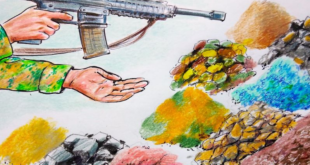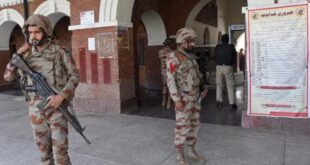Taiwan said Wednesday that it is willing to shoot down Chinese drones that have been flying near Taiwan-occupied Pratas Island in the South China Sea, a response to what analysts view as the latest pressure tactic from Beijing.
Ocean Affairs Council Chair Lee Chung-wei told Taiwan’s legislature that the Taiwanese coastguard had recently identified Chinese unmanned aerial vehicles (UAVs) operating near Pratas, which sits about 170 nautical miles to the southeast of Hong Kong in the northern part of the South China Sea.
Lee indicated that Taiwanese forces would open fire on UAVs that fly over the island, which is also claimed by the People’s Republic of China.
“If we need to open fire, we will open fire,” Lee said, noting that the drones have thus far only circled Pratas and that similar activity has not been observed near Itu Aba — Taiwan’s base in the Spratly Islands which lie further south.
Lee did not specify what kinds of drones China has been sending to Pratas.
These drone flights, which Lee described as “gray zone” activity, come as China is ramping up pressure on Taiwan.
Aircraft belonging to the People’s Liberation Army (PLA) have been conducting regular flights through Taiwan’s air defense identification zone (ADIZ) for months on end, including through the southwestern portion of the ADIZ near Pratas, RFA reported in February.
The Ministry of National Defense reported a record 20 PLA aircraft entering Taiwan’s ADIZ on March 26.
Jessica Drun, a non-resident fellow at the Project 2049 Institute, told RFA that “these gray zone activities are an attempt to wear down Taiwan psychologically and from a resource perspective.”
“This is happening against the backdrop of ever-deepening U.S.-Taiwan ties, a domestic population in Taiwan that has more or less rejected China’s framework for cross-Strait relations, and an increasingly assertive Beijing the world over,” Drun said.
Although Taiwan is a self-governing democracy, Beijing claims Taiwan as its own territory, to be annexed by force if it deems necessary.
While the drones currently operating near Pratas are likely to be for reconnaissance or testing Taiwan’s resolve, PLA researchers have written about the possibility of using armed unmanned systems in combat scenarios that would involve Taiwan.
For instance, PLA researchers have recently published studies on using unmanned surface vehicles, drone swarms and helicopter-like UAVs during amphibious landing operations, such as efforts to invade Taiwan or seize small islands like Pratas and Itu Aba.
Michael Mazza, a visiting fellow at the American Enterprise Institute, said that Pratas Island may be an “attractive target” for China.
“China might one day wish to occupy the islands, either as a first step in an assault on Taiwan, as a means of coercing Taiwan into unification, as a way to test international responses to an attack on one of Taiwan’s offshore islands, or as part of an effort to reenforce control over the South China Sea,” Mazza said.
Taiwan and China are just two of the claimants in the disputed South China Sea. The others are Brunei, Indonesia, Malaysia, the Philippines and Vietnam.
Even as China has been turning up the heat to assert its sweeping land and sea claims in the South China Sea and to pressure Taiwan, other militaries are making their presence known as well.
A U.S. carrier strike group conducted a bilateral military exercise with the Royal Malaysian Air Force (RMAF) in the South China Sea on Tuesday and Wednesday, the U.S. Navy announced in press release.
“The two days exercise aims to strengthen the bilateral relations and military diplomacy,” the RMAF said in its own statement. The exercises are to “enhance the operational interoperability and overall cooperation among the two forces,” it added.
 Eurasia Press & News
Eurasia Press & News



